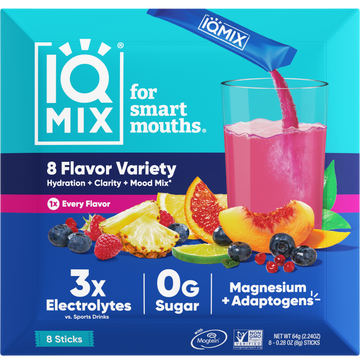High-protein, low-carb diets have become increasingly popular as a means of shedding weight, increasing muscle mass, and improving overall health.
Many well-known varieties of this eating pattern exist, including the ketogenic (keto) diet, the paleo diet, and the Atkins diet, however, this way of eating doesn’t require a label or brand. At its core, it’s simply a diet based on macronutrient (macro) ranges.
Macros are the three categories of nutrients that provide you with most of your energy: protein, carbohydrates, and fats. The macros of importance on this diet are protein and carbohydrates. Fat is also included, but it’s not the focus.
So, what does a high-protein, low-carb diet entail? We’ll be diving into that in this article. Read on to learn this eating plan’s basics, benefits, and approved foods.
What Is a High-Protein, Low-Carb Diet?
A high-protein, low-carb diet is, unsurprisingly, high in protein and low in carbs. That’s a pretty vague statement, though. How much protein is considered “high” and how many carbs are considered “low?”
There isn’t a cut-and-dry answer to that, but high-protein generally refers to consuming more than the recommended dietary allowance (RDA) for protein, which is 0.8 grams of protein per kilogram body weight.
Some studies suggest that the RDA for protein is too low and should be higher (as follows) to meet functional needs:[*]
- For sedentary people: 1 gram per kg body weight
- For moderately active people: 1.3 grams per kg body weight
- For very active people: 1.6 grams per kg body weight
As for the “low-carb” portion of the equation, the National Institute of Health (NIH) defines a low-carb diet as one that contains fewer than 26% of calories from carbs.[*]
Simply put, a high-protein, low-carb diet exceeds the RDA for protein and limits carbs to 26% or less of your total daily calories.
What Are the Benefits of a High-Protein, Low-Carb Diet?
This way of eating is popular for good reason. It offers many potential science-backed health benefits.
#1: Weight Loss
Perhaps the most common motivation for adopting a high-protein, low-carb diet is weight loss. This way of eating is supported by tons of research demonstrating its ability to help people lose weight and keep it off.[*][*][*]
How does this way of eating support a healthy weight? For one, high protein intake reduces hunger hormones and stimulates fullness hormones, helping you feel fuller longer.[*]
Limiting your carbs has a similar effect. Research shows that people following very low-carb diets, such as keto, tend to eat less due to reduced hunger hormones like ghrelin and neuropeptide Y.[*]
To top it off, both high-protein and low-carb diets may also rev up calorie burning.[*][*]
#2: Improved Body Composition
When losing weight, the goal is to shed fat while maintaining or gaining muscle mass. This will help preserve your strength and, consequently, your ability to perform everyday tasks.
Higher muscle mass with lower fat mass has also been linked to a lower risk of heart disease, cancer, and dementia, and may be a predictor of longevity.[*] Not to mention, maintaining (or gaining) muscle while losing fat will result in a lean, toned body.
So, how do you maintain your muscle mass during the weight loss process? The answer lies in getting enough protein, as this macro is essential for building, maintaining, and repairing muscle.
By reducing carbs, eating enough protein, and adding in some strength training, you’ll be on the road to fat loss and muscle maintenance (or gains!). This holds true for overweight people and athletes alike.[*]
#3: More Stable Blood Sugar
Carbs are converted into glucose (sugar) in the body. Even carbs that aren’t sweet, such as starchy foods, break down into glucose. As a result of consuming carbs, blood sugar levels rise, stimulating the need for insulin.
When you limit carbs in your diet, blood sugar spikes will naturally decrease, leading to more stable blood sugar throughout the day. This is particularly important for people with diabetes, but will also benefit the well-being of non-diabetics in the form of more stable energy, hunger, and moods.[*]
#4: Other Health Benefits
Here are a couple of other potential benefits to make note of:
- Hormonal health: Consuming protein provides your body with amino acids that are used to produce specific hormones, like estrogen, insulin, thyroid hormone, serotonin, melatonin, and dopamine (to name a few).[*]
- Ketosis benefits: A high-protein keto diet is a variety of a high-protein, low-carb diet. This way of eating entails consuming about 30-35% of your calories from protein, 10% from carbs, and 50-60% from fat. By following these macros, you’ll enter a state called ketosis, which provides many benefits, such as reduced cravings, more stable energy, improved brain health, and reduced inflammation.[*][*][*]
What Foods Should You Eat on a High-Protein, Low-Carb Diet?
Not sure what a high-protein, low-carb diet looks like in action? Here are the foods to regularly include on your plate:
- Protein sources: grass-fed meat, wild-caught fish, eggs, shellfish, collagen protein, whey protein, and low-carb protein bars like IQBAR. IQBARs are vegan and keto-friendly and contain only 1-2 grams of sugar and 2-3 net carbs per bar. Each bar also contains 12 grams of protein and five key brain nutrients.
- Low-carb veggies: leafy greens like spinach and kale, asparagus, broccoli, and cauliflower.
- Low-carb fruits: berries, lemons, limes, coconut, and avocado.
- Healthy fats: extra-virgin olive oil, avocado oil, coconut oil, grass-fed butter, and MCT oil.
- Nuts and seeds: walnuts, almonds, macadamia nuts, chia seeds, flaxseed, hemp seeds, pumpkin seeds, and sunflower seeds.
Higher-carb fruits and veggies are also acceptable in limited amounts.
Is a High-Protein, Low-Carb Diet Right for You?
Consuming up to 2 grams of protein per kg body weight is typically considered safe for most people long-term.[*] That being said, it’s always recommended that you check in with your doctor before making any drastic changes to your diet, especially if you have existing health issues.
If you want to ease yourself into a high-protein, low-carb diet, start by increasing your protein intake. Protein is required for so many essential bodily processes and most people don’t get enough.
Once you feel comfortable with that change, start gradually lowering your carb intake until you find what works for you. You’ll know it when you find that sweet spot!




